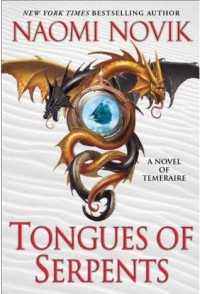Tongues of Serpents - Naomi Novik

Another pleasant entry in Novik's Temeraire series to start the reading year off. Tongues of Serpents sees disgraced Regency aviator William Laurence and his Celestial dragon Temeraire transported to Australia, mainly to keep them out of trouble. With them go three dragon eggs, intended as a foundation for an aerial force at Sydney, as well as the fire-breathing dragon Iskierka, her captain Granby, and a group of second-rate aviators willing to accept such a remote posting in return for a chance to captain one of the unhatched dragons. Among these latter is the odious Rankin, whose neglect once killed a dragon in his keeping. This motley gathering arrives to find Sydney in the midst of something of a dispute: two powerful merchants have deposed the governor Bligh, and the burgeoning port is a riot of drunkenness and squalor. After a few unpleasant days here, the party accepts a mission to build a road over the mountains and into the heart of the continent; but as they search for a viable route one of the three precious eggs is stolen, and they are forced to follow it into the outback.
It has to be said that I don't enjoy Novik's accounts of distant lands nearly so much as I do her careful delineation of the relationships and social compromises that make up Regency society. I thoroughly enjoyed the beginning and ending of Serpents: Laurence's arrival in Sydney and the care with which he acts to prevent himself becoming embroiled with either party involved in the coup, with the added complication of the eight months it takes for any kind of news to reach England, and the discovery of the Chinese port at the other side of Australia, with the various diplomatic and political problems this entails, are just utterly fascinating pieces of writing. I think Novik is very good at describing this alien society, with its myriad social rules and almost impossibly tortuous laws of seniority, without alienating her readers from its characters or straying too far from the bounds of credibility (dragons notwithstanding). And I also think she is very good at complexity: at neither exoticising or flattening other cultures, always forcing us to read beyond the surface. (Having said that, I am a white Westerner; so I'm happy to hear other views.) All of her characters operate to some extent in shades of grey, and having to reconcile morality with duty is a common conflict for everyone.
The central portion of the novel, though, dealing with the group's journey across Australia's outback, is much less interesting; I'm not convinced that very much happened. Of course, this may be the point to some extent: we share in their boredom as they pass through miles and miles of the same landscape. But it means that the book loses half a star.
Still, a good start to the year, and an indication that I might actually enjoy the rest of the series *cough*Empire of Ivory*cough*
 3
3


